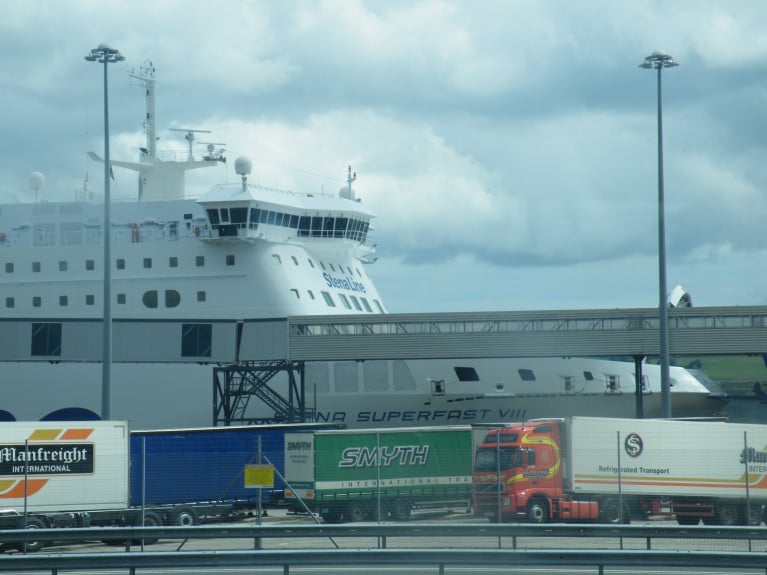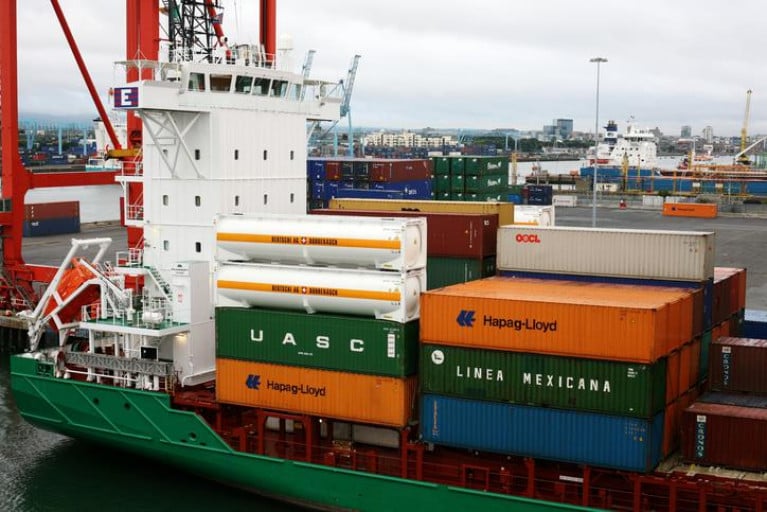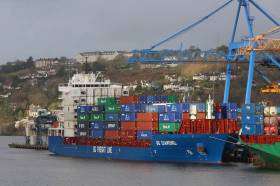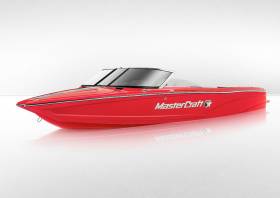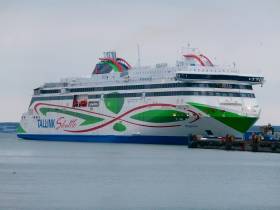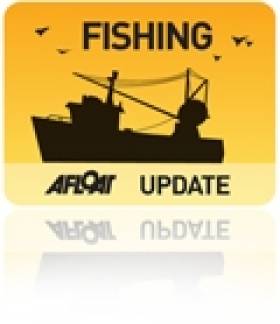Displaying items by tag: EU
EU Seeks Design Proposals for Energy Saving Fishing Vessel
The European Commission is seeking proposals to develop a fishing vessel equipped with alternative propulsion technologies and improved energy performance.
The “demonstrator” vessel should foster energy transition in the fisheries sector, and has a budget of 2.2 million euro, drawn from EU pilot project funds.
The Commission lists the expected impacts as:
To develop and demonstrate viable solutions for fishing vessels which improve the energy performance, including reducing greenhouse gas (GHG) emissions and costs;
To increase knowledge on the challenges, benefits and impacts (including economic, environmental and in terms of health and safety of fishers) of different technologies aimed to improve the energy and emissions performance of fishing vessels;
To strengthen understanding of the potential to adapt existing technologies to the fishing sector;
To raise awareness of and broaden the possibilities offered to fishers to become more energy efficient and initiate the energy transition of fishing vessels.
It says long term expected impacts include:
- Improving the resilience and economic viability of the EU fishing fleet;
- Improving understanding of technical, social, legal, regulatory and policy barriers to energy transition in fisheries;
- Reduced fuel consumption and GHG emissions from fishing vessels and improved energy efficiency in their range of activities;
- Accelerating the adoption of new technologies in the fisheries to foster energy transition;
- Improving the business environment and raising awareness among investors.
The closing date for proposals is June 11th, and more details are here.
Marine Minister Meets Fishing Industry to Discuss EU/Norway Negotiations and Fleet Scrappage Scheme
Marine Minister Charlie McConalogue on Tuesday (10 January) today met fishing industry representatives at the Marine Institute in Galway and discussed the negotiations ongoing this week, between the EU and Norway, on a fisheries agreement.
The minister said: “Our interests relate to blue whiting and the level of the transfer of blue whiting quota to Norway to pay for other fishing opportunities that the EU is seeking and the level of access to EU waters which, in practice, involves fishing in Ireland’s 200 miles zone. These negotiations will recommence on Wednesday. The discussions with Irish industry representatives today were very useful and enabled a full consideration of the issues and the negotiating options.”
He added that he is pleased a number of Irish fishing industry representatives will attend this round of negotiations in Brussels and will assist his team as talks progress.
“I am continuing to engage directly with Commissioner Sinkevicious, EU Commissioner for Fisheries and the Environment to ensure that he understands Ireland’s concerns and its priorities in these negotiations,” he said.
Minister McConalogue also used this opportunity to provide an update on the voluntary fishing fleet scrappage scheme as recommended by the Seafood Task Force.
The scheme was focussed at whitefish polyvalent and beam trawl vessels, with the objective of voluntarily removing 8,000 GT and 21,000 KW to rebalance the fleet and improve the viability of the remaining fleet by making available more quota to them.
The minister briefed the industry that due to the level of interest from vessel owners, and the calculations from Bord Iascaigh Mhara on the levels of direct payments required to meet the objective of the scheme, that an increase in budget was required.
Additional funds have been successfully sought from the Department of Public Expenditure and Reform and an updated EU State Aid approval has been secured, he added.
“In order to ensure that all fishers who wished to take part in the scheme could do so and that the targets set by the Task Force could be delivered, I have increased the budget for direct payments under the scheme from €60 million to a maximum of €75 million with tax reliefs increasing proportionately,” the minister said.
“Offers for voluntary decommissioning will now be made to 57 vessel owners and the decommissioning of those vessels will make available an extra €34 million in quota for the remainder of the whitefish fleet improving their profitability and securing the future of the fleet.
“I am satisfied that I have now enabled all those who have chosen to apply for this scheme receive the full value of the scheme payment as guided by the Seafood Task Force recommendation.”
Provisional Agreement between EU Parliament & Council to Improve Stability Requirements for ‘Ro-Ro’ Passenger Ships
The European Parliament and Council have reached a provisional political agreement on amending the current legislation in order to improve stability requirements for roll-on/roll-off (ro-ro) passenger ships.
The amended directive will play an important part in ensuring the safety of these vessels in the EU, in accordance with the new international standards in the field (SOLAS Convention).
‘Ro-ro’ passenger ships provide numerous maritime links within member states, between member states and with third countries. They are therefore of major importance to passenger and freight transport in Europe. The revised directive is also a direct consequence of one of the worst maritime accidents in European waters, the sinking of the ‘Estonia’ in 1994.
The new legislation ensures, as far as possible, consistency with international standards for the stability of damaged passenger ships, which were recently updated by the International Maritime Organization (IMO) under the 2020 International Convention for the Safety of Life at Sea (SOLAS Convention).
The IMO is introducing a new model for assessing the survivability of damaged ro-ro passenger ships, as well as new related requirements. However, these new international standards appear to be insufficient in the light of the requirements already in force in the Union for new small vessels, which is why the new law maintains a level of safety requirements equivalent to existing Union law for those ships.
The revised directive also aims to strengthen fleet entry requirements within the Union for existing large vessels that have not yet been certified in the Union. The text of the provisional political agreement maintains the general purpose of the initial Commission proposal, with the exception of the extension of the transposition deadline from 12 to 18 months.
Next Steps
Today’s provisional political agreement is now subject to approval by the two co-legislators. On the Council side, the Czech presidency intends to submit the agreement to the member states’ representatives (Coreper) as soon as possible with a view to its formal approval by the Council.
To dowload the Commission proposal, click here for further links.
Also available here is the Directive 2003/25/EU.
Strong Response EU Threatens to UK Protocol Plans
Senior figures from EU member states have threatened a strong response to the UK's legislation.
German Chancellor Olaf Scholz yesterday hinted at trade measures against the UK, while the EU's chief negotiator, Maroš Šefčovič, said the European Commission could resume legal action against London.
Mr Šefčovič will brief members of the European Parliament later today.
Last night, one senior EU figure after another denounced the UK bill that would tear up the protocol.
Mr Scholz said the EU had its entire toolbox at its disposal, in other words, the EU could take retaliatory trade measures.
Senior Italian, Dutch and Austrian ministers all accused the UK of threatening to break international law.
The European Commission waited until the bill was laid before the House of Commons before responding.
Mr Šefčovič said the EU would not renegotiate the protocol.
More from RTE's report with business leaders sounding a note of caution.
Minimum Safety and Health Requirements for Improved Medical Treatment on Board Vessels
The European Union (Minimum Safety and Health Requirements for Improved Medical Treatment on Board Vessels) Regulations 2021 transpose into Irish law European Council Directive 92/29/EEC (as amended) concerning the minimum health and safety requirements for improved medical treatment on board vessels.
These regulations give effect to the directive in full, included amendments to the annexes set out in European Commission Directive (EU) 2019/1834 detailing requirements of medical supplies and equipment to be carried on board for each category of vessel.
In line with the requirements set out in the annexes to the revised directive, the medicine and required dosage under each category is outlined in Marine Notice No 60 of 2021 (available to download below) in order to assist vessel owners in complying with the directive.
Owners and masters of Irish vessels are required to comply with the requirements of the amended directive as of this past Saturday 20 November.
ESPO Says TEN-E Review Must Recognise Role of Seaports as Key Players in Energy Sector
European Commission is expected in December to publish its proposal for reviewing the Trans European Network for Energy (TEN-E) Guidelines Regulation of 2013.
According to the European Sea Ports Organisation (ESPO) they welcomed the revision but in order for the review to align with the Green Deal objectives European ports stress the importance of recognising the central role of ports in Europe’s new energy systems.
“As European ports, we welcome the upcoming review of the TEN-E network and are excited to help Europe on the path towards a net-zero energy network by 2050. Nonetheless, we stress the need for the European Commission to recognise ports as key actors and partners in the energy transition. There are a huge amount of activities in ports that enable clean energy, from production and storage to import and hinterland distribution. We therefore urge the Commission to make sure they recognise the important role of ports”, noted Isabelle Ryckbost, Secretary-General of ESPO.
Europe’s Ports are key players in the energy sectors. They are particularly important in the development of the hydrogen economy: From production and storage facilities to fuelling, recharging and distribution, ports will need to invest heavily to support the ramp-up of hydrogen in Europe. This extends to imports and related facilities, alongside facilities to convert offshore renewable energy into green hydrogen, a prerequisite for the hydrogen economy to reach European Green Deal aims.
Ports also play a key role in the production and distribution of other fuels. This is not, however, recognised in the current TEN-E legislation, where few ports active in energy systems are included in the project corridors. ESPO underlines that this oversight cannot be repeated when hydrogen is included in the legislation. Ports’ role must be reconsidered in the context of the other energy carriers.
TEN-E Guidelines Regulation 347/2013/EC has the aim of linking energy infrastructures in the EU. It was adopted in 2013 alongside the Trans European Transport (TEN-T) and Telecommunication Networks (eTEN). Similar to the TEN-T network, the TEN-E legislation is based around 9 corridors relating to electricity, oil and gas and 3 thematic areas (where cross-border carbon dioxide networks are included). The Commission began its revision of the TEN-E policy in early 2020 with one key motivation being to bring the legislation in line with the goals of the European Green Deal.
ESPO’s priorities on the forthcoming TEN-E review can be downloaded here.
Irish Exporters Plead for Intensification of No-Deal Brexit Planning
#Ports&Shipping - Irish exporters reports RTE, have called for an urgent intensification of no-deal contingency planning by the government and the EU in the face of heightened uncertainty around Brexit.
The Irish Exporters Association (IEA) has warned that the risk of a disorderly exit by Britain from the EU has increased following the delayed vote on the EU-UK Withdrawal Agreement and today’s no-confidence vote on Theresa May’s leadership.
According to Simon McKeever, chief executive of the IEA, the potential economic impacts of the UK crashing out of the EU next year will be "immediate, extensive and far-reaching for Irish businesses."
For more on the story click here.
European Brokers Hampered By New EU Tariffs On US Pleasure Craft
#Trade - European importers of pleasure craft from the US have already been impacted by new EU tariffs that add an average of €20,000 per boat.
According to Boating Business, dealers across Europe have been placing orders for new boats on hold since the tariffs came into effect in June as part of the response to the Trump administration’s steel and aluminium levies.
Yacht transport companies are also affected by the situation as the majority of their small boat business is from the US to European markets, says logistics specialists Peters & May.
The new rules apply to all pleasure craft in transit since 22 June, regardless of size, with only inflatable boats excepted.
And the increase from 17% to 25% on import costs is having what are perhaps unintended consequences for European brokers.
“The duty is intended to protect our industries, but we sell waterski and wakeboard boats which are not made over here,” says Jason Bates of Nautique Midlands in the UK.
Boating Business has more on the story HERE.
Irish to Make Further Maritime Contacts Through Connecting Europe Conference
#ports&shipping - Following the Irish Maritime Development Office (IMDO) attendance of last week's LISW17, the Irish government shipping agency will also be attending the Connecting Europe Conference taking place this week in the Estonian capital of Tallinn.
The IMDO will also be exhibiting at the two-day event held at the Nordea Concert Hall between 21-22 September.
The event is being organised by the European Commission, Directorate-General for Mobility and Transport (DG MOVE), in cooperation with the Estonian Presidency of the Council of the European Union and Ministry of Economic Affairs and Infrastructure of the Republic of Estonia.
At the Connecting Europe Facility Conference in Tallinn, a number of key Irish ports and enterprising marine companies in areas of ICT and digitalisation will exhibit together with Ireland’s Marine Development Team and the Irish Maritime Development Office to communicate Ireland’s marine opportunity.
Our delegation is keen to build connections for potential collaborations in future projects, especially in the in the area of research, and to discuss Ireland's strengths in areas such as Digital Ocean, Smart Ports and the development of Ireland's ICT cluster.
#Fishing - Marine Minister Simon Coveney today (Wednesday 20 May) welcomed an EU Commission proposal for a comprehensive prohibition on commercial fishing for seabass in the Irish and Celtic Seas which underpins the conservation actions already taken by Ireland with regard to this vulnerable stock.
“Ireland has had stringent measures in place for the protection of seabass, a very important angling species, for a long number of years. However, those measures only applied to Irish vessels," said the minister.
"I have been very active over the past six months, lobbying the EU Commission and relevant member states on this issue. I am delighted that the EU finally recognises the lead taken by Ireland by extending our ban on commercial fishing to all EU vessels operating in the waters around Ireland.”
Minister Coveney added: “The scientific advice for seabass is very worrying and we must all do our utmost to protect this stock. Ireland has been to the forefront in being the only EU member state to afford maximum protection to this stock and today’s proposal will enhance that protection by making the Irish model obligatory for all EU vessels in the Irish & Celtic Seas.”
Once the measures are approved by the Council of Ministers, all commercial fishing for seabass will be prohibited in the waters around Ireland. Details of the prohibition areas are included HERE.


























